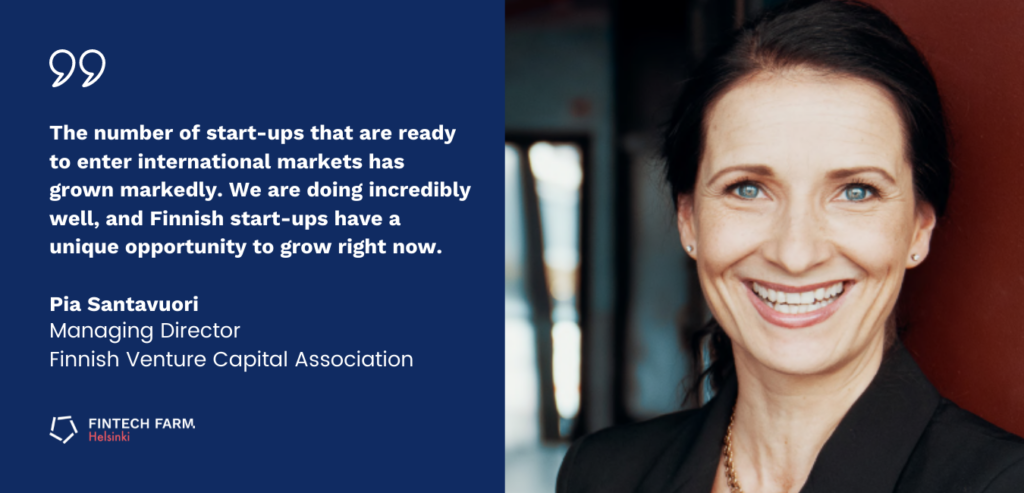Full article was published in Helsinki Fintech Guide 2021.
According to Pia Santavirta, Managing Director of the Finnish Venture Capital Association, start-ups in Finland are on a roll. While fintechs have so far not matured to the level of landing bigger funding rounds, she sees many great opportunities for them, particularly by helping existing financial institutions reinvent themselves.
Finnish start-ups collected 951 million euros of equity funding in 2020, doubling records set during the two previous years. This number becomes even more impressive when compared to Gross Domestic Production: According to recent Invest Europe statistics, venture capital investments as a share of GDP in Finland is 77% higher than in the UK, which holds the second position.
2020 was not a one-off spurt, already in 2021 we have seen several huge funding rounds. Food delivery and payment startup Wolt alone collected 440 million euros, so it looks like 2021 will be another record year.
Tech-savvy dealmakers punch through lockdown blues
The great result we got in start-up funding is remarkable when compared to the last big crisis, the financial crisis in 2009, when foreign investors pulled out of the market and foreign investment in start-ups fell by half. It then took five years for investments to recover to their previous level.
In anticipation of a similar outcome, the Finnish government initiated the “venture bridge” program meant to replace this expected shortfall. The government agency Tesi would match any investment made by domestic investors euro for euro, effectively doubling the funding power of domestic investors. This program saw some use during the crisis, but by now we can clearly conclude that foreign investors have not scaled back but rather increased their investments in Finland. Out of the close to 1 billion euros invested in Finnish start-ups, about half came from foreign investors.
One big concern was whether it would be possible to conclude deals purely on a remote basis. The answer, fortunately, turned out to be yes. Most deals were of course supported by existing connections and networks, but some were concluded purely online. It is fantastic that both investors and start-ups could adapt so quickly to the challenges posed by social distancing and travel restrictions. Perhaps it really should not be such a surprise, considering the progressive nature of both groups. It turned out that at least in Finland, the pandemic didn’t cause as much as a hiccup for start-up financing.
Local investor muscle is the gateway to international success
It all began ten years ago when Slush was founded. Until that time, start-ups had faced a lonely road. Now everyone understands the value of networking, and everyone involved is heavily invested in building and maintaining their contact network. Expanding this network into an international one is a key step for late-stage start-ups. It increases the size of potential funding rounds by several multiples and also opens the doors for international business expansion.
One important factor to note is the key role played by domestic investors in facilitating network expansion and especially the involvement of foreign investors. According to Pia Santavirta;
“In 85 percent of cases foreign investments are realized jointly
with local investors. Without a strong local’ investor scene it is very difficult for foreign investors to discover local opportunities”The number of start-ups that are ready to enter international markets has grown markedly. We are doing incredibly well, and Finnish start-ups have a unique opportunity to grow right now.
Fortunately, the number of Finnish venture capital investors has virtually doubled in the last five years, as sixteen new fund teams have raised their first VC fund. This means that the domestic investor pool is now strong enough to support a high level of growth in foreign investments as well. So now that funding is in good supply, and start-ups are booming, the next bottleneck to solve is going to be talent. How do we attract talented individuals to Finland? How do we ensure a sufficient supply of skilled workers? We hope that once people realise we have the fastest growing start-up field in Europe, we will see more interest not only from investors, but talented workers as well.
The Finnish sandbox
What makes Finland a good place to start a business lies in the nature of the local market; The manageable size of the market, the ease of approaching institutions and corporations, the tech-savvy Finnish consumer.
Business circles being small in a country with a 5 million population makes it easier to get in touch with many top managers. Partly because you are more likely to find someone to help introduce you, partly because they simply aren’t as deluged with meeting requests as they are in bigger places. This gives start-ups a better chance of getting to pitch their ideas.
We hope that once people realise we have the fastest growing start-up field in Europe, we will see more interest not only from investors, but talented workers as well.
On the other side, Finnish consumers are among the first adopters of new technology. As we saw during the lockdowns, even small children very quickly adapted to distance learning over remote connections. In Germany, at the same time, homework was being transported between homes in buckets, an option so backwards that no one here even thought of it. Even grandparents over 80 years old have learned to use modern communications technology and online banking. Finland is a great place to test consumer-oriented innovations because such a large part of the population, toddlers and elders alike, is ready to try new tech-based services.
Fintech, a realm of untapped potential
Fintech entrants still play a fairly small role in the Finnish start-up field, which has been a big surprise for me. While there are many promising fintech companies,we have witnessed only few ones to raise very large amounts of equity.
I believe there is enormous potential still to be realized in the fintech sector; Banks and insurance companies, for example, have a slew of issues that could be better dealt with by specialised outside fintech companies. In-house solutions are costly, and due to the closed environment in which they are developed, less likely to be cutting-edge. Anyone who can offer improved systems for managing regulatory compliance, for one, would surely catch their attention.
One promising area where fintech start-ups have plenty of know-how to share is in ESG, the next big regulatory challenge for the financial industry. Sustainability is already an integral part of the business model of most start-ups. Exporting that knowledge and providing tools for other companies to manage their ESG issues is an obvious business opportunity.
Another interesting case close to home is Rundit Oy. It provides software tools for portfolio management, monitoring and start-up investor reporting. They started by working with Finnish venture capitalists, and once they had proven successful on the local market that opened doors to expansion on the wider international arena.
In fact, there is a growing number of very successful new fintechs blazing the trail for others to follow.



